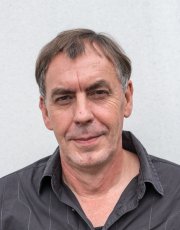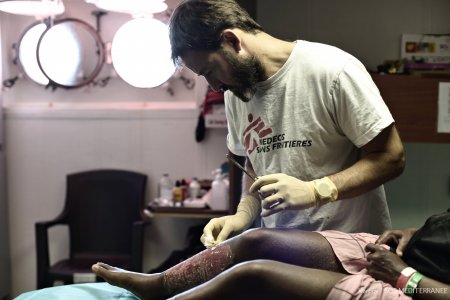
The state: from sieve to smuggler
Jean-Hervé Bradol

Medical doctor, specialized in tropical medicine, emergency medicine and epidemiology. In 1989 he went on mission with Médecins sans Frontières for the first time, and undertook long-term missions in Uganda, Somalia and Thailand. He returned to the Paris headquarters in 1994 as a programs director. Between 1996 and 1998, he served as the director of communications, and later as director of operations until May 2000 when he was elected president of the French section of Médecins sans Frontières. He was re-elected in May 2003 and in May 2006. From 2000 to 2008, he was a member of the International Council of MSF and a member of the Board of MSF USA. He is the co-editor of "Medical innovations in humanitarian situations" (MSF, 2009) and Humanitarian Aid, Genocide and Mass Killings: Médecins Sans Frontiéres, The Rwandan Experience, 1982–97 (Manchester University Press, 2017).
Opinion piece in Le Monde, 10 September 2018
Numerous politicians, from Daniel Cohn-Bendit to Marine Le Pen and including Emmanuel Macron, denounce what they claim is collusion between organisations helping migrants (humanitarian workers) and smugglers (criminals). One group operates in full public view, the other out of sight, but both are said to be working together to help people illegally cross borders.
It is therefore worth clarifying what we mean by smuggler, stripping away the enveloping aura of mystery to expose the reality. The first thing needed to open a border to a potential migrant is control over that self-same border. There is no such thing as a no man’s land in these disputed and sometimes dangerous border regions, they are controlled gun in hand. And who is holding the guns? The forces of order, either regulars, such as gendarmes and customs, police and army officers, or irregulars, such as militias and armed groups in countries like Libya where the state is weak.
We are not denying the existence of freelancers who know how to avoid border checkpoints and act beyond the reach of state forces and militias. But this freelance activity remains marginal in comparison to the hundreds of thousands of people who travel along government-controlled “migratory motorways”.
How do we know that smugglers are usually state employees and not shadowy criminals? Because Médecins Sans Frontières has been travelling these roads to exile for over forty years. On the few occasions when we were unable to obtain prior authorisations, we never crossed a border unaided. Each time the situation arose, we contacted the local forces of law and order for assistance. Sometimes we bribed them. The fact is that crossing borders is an activity with a market.
Brokers and smugglers
It is almost always intermediaries, incorrectly referred to as smugglers, who offer their services as go-betweens linking up travellers with the true smugglers – the vast majority of them state employees – who have the power to permit them to continue their journey. The services these go-betweens provide are nothing like those of a smuggler. They are simply brokers. This is an important nuance to understand and can best be compared to the difference between an insurance broker and an insurance company. Only the insurance company has the power to pay out on a claim.
In our experience, it is usually state representatives who have the power to allow people to cross borders. However much it might displease Italian interior minister Matteo Salvini, most people who enter Italy after crossing the Mediterranean do so courtesy of the Italian navy. Ships chartered by NGOs can only dock at ports around the Mediterranean with government permission. And it is Italian state employees in Ventimiglia and the Southern Alps who facilitate departures for France.
But what occurred in 2015 is without doubt the most striking example of all, when Turkey allowed almost one million people to enter Europe. This led to the creation of mass migration routes so that these groups of people on the move could reach countries willing to receive them, primarily Germany and Sweden. The route out of Turkey was then closed down as a result of decisions taken by the states themselves: Turkey first, followed by the transit countries of the Balkans and, finally, the countries that were the migrants’ ultimate destinations.
None of this was the work of shadowy smugglers let alone of collusion with humanitarian workers. It is this massive involvement of state employees in the management of successive waves of migrations that explains why traffickers, who are universally condemned, are almost never apprehended. When a network is dismantled, business carries on as usual or quickly picks up again. The true smugglers, the forces of law and order, quickly replace one intermediary, or broker, with another.
Double benefit
In reality, very few clandestine journeys avoid customs checkpoints because states use control of their borders to obtain a double benefit, economic and political. They can scarcely be expected to turn their back on the financial gains generated by this activity. Where so-called traffickers earn hundreds of thousands of euros, states receive billions in subsidies in return for regulating flows. These vast sums, allocated for managing migration, thus sustain an entire industry.
There is nothing new in this, and we have a name for this trade: human trafficking. It generates benefits that are more than simply financial. Election results across Europe demonstrate that rabble-rousing instrumentalization of migration has become a good way to get elected as head of state.
The losers in these narrow games of power and self-interest are those who die on the journey, those who suffer violence and survive in abject conditions. According to the International Organization for Migration, 5,773 bodies were recovered and 11,089 lives were lost in the Mediterranean between 1 January 2014 and 30 July 2018.
Migrants suffer and die so that the countries they leave from, transit through and hope to reach can maximise what they perceive to be the benefits that their participation in the political economy of this human trafficking accords them. This self-renewing and self-perpetuating practice has existed around the Mediterranean for centuries.
What should we think of politicians at the head of countries who are currently claiming to be able to rapidly bring a halt to this process and who denounce NGOs as accomplices in an activity which is actually mainly organised by those same countries?
 Kenny Karpov
Interview
Kenny Karpov
Interview
Mediterranean: the Aquarius Aquarium
09/13/2018 Olivier FalhunAs an MSF nurse, François-Xavier Daoudal returned at the end of June after spending three weeks on board the Aquarius. During his time on the ship, 629 people were rescued. However, immediately after the rescue operation, the Italian and Maltese authorities refused the ship permission to dock, triggering a huge political and media furor. The Aquarius was left stranded at sea for several days before being able to transfer some of the rescued migrants to two Italian navy ships. All passengers were finally disembarked in Spanish port Valencia. What can be drawn from such an experience? Read on to see what F-X had to say during an interview on the political implications, life on board the Aquarius and the issue of people smuggling. He also shared with us what the migrants themselves had to say.
NGOs are not in collusion with smugglers
07/10/2018 Michaël Neuman Thierry Allafort-DuvergerHumanitarian aid organisations carrying out rescues at sea were made into the accomplices of human traffickers. This accusation is as absurd as it is unacceptable. Not only do rescue operations at sea save people from drowning, but they evacuate people in situations of immediate danger in Libya, MSF recalls.
To cite this content :
Jean-Hervé Bradol, “The state: from sieve to smuggler”, 10 septembre 2018, URL : https://msf-crash.org/en/state-sieve-smuggler
If you would like to comment on this article, you can find us on social media or contact us here:
ContributePériode
Newsletter
Subscribe to our newsletter to stay informed about our latest publications. Interested in a specific author or thematic? Subscribe to our email alerts.
